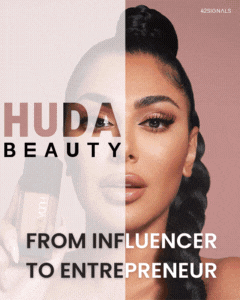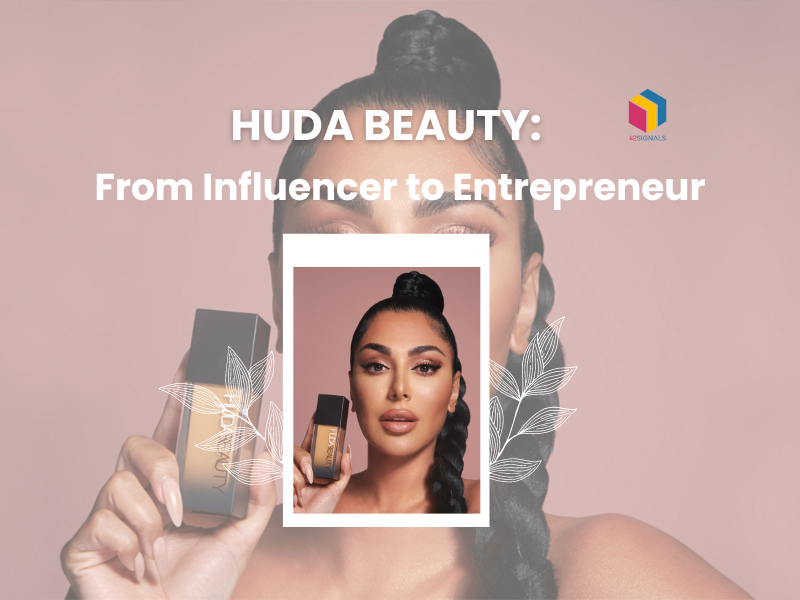Huda Kattan is a name that needs no introduction in the world of beauty and makeup. She is the woman behind one of the most successful and influential cosmetics brands in the industry – Huda Beauty. But how did this former beauty blogger turn herself into a global phenomenon?
Let’s take a closer look at Huda’s journey from being an aspiring makeup artist to becoming a savvy businesswoman.

About Huda Kattan and Her Life Before Huda Beauty
Before launching her brand in 2013, Huda Kattan had already made a name for herself in the online beauty community. With over 48 million followers across social media platforms such as Instagram, Facebook, and YouTube, Huda established herself as a leading voice in the beauty space.

Image Source: YouTube
However, long before she became a household name, Huda worked as a freelance makeup artist while starting her own beauty blog, where she shared tips, tricks, and tutorials about all things related to makeup. It didn’t take long for Huda to gain popularity, eventually transforming her hobby into a full-time job and building a loyal following of fans who loved her approachable yet glamorous style.
The Launch of Huda Beauty
Inspired by her success as a beauty blogger and influenced by her love for creating unique and innovative products, Huda launched Huda Beauty in 2013 with her sister Mona. Their first product, false eyelashes, quickly gained traction among makeup enthusiasts worldwide due to their high quality, affordability, and wide range of styles.
What sets the brand apart from its competitors is the fact that Huda herself tested every single lash prototype until it met her standards. This level of dedication and attention to detail resonated with consumers, making her brand an instant hit. Since then, the company has expanded its offerings to include foundations, concealers, eyeshadows, lipsticks, and more, always prioritizing innovation and inclusivity.
How Huda Beauty Pioneered Influencer Owned Brands
When Huda Beauty burst onto the scene, there were very few influencer-owned beauty brands. By proving that influencers could successfully transition into entrepreneurs, Huda paved the way for countless others to do the same.
Some notable names that followed suit include James Charles with his Painted, Nikkie de Jager with her brand Nimya, and Jeffree Star with his Jeffree Star Cosmetics, just to name a few. These influencers have taken inspiration from Huda’s story and used their platform to build businesses centered around their expertise and personal style.
Peak of the Brand
By 2019, Huda’s brand reached new heights it boasted annual sales of approximately $200 million, solidifying its status as a major player in the beauty industry. Moreover, Huda graced several magazine covers, won numerous awards, and collaborated with some of the biggest stars, like Jacquline Fernandes and Lottie Tomlinson.
Downfall of the Brand
However, not everything went according to plan for the brand. Following Huda’s decision to step back from day-to-day operations and appoint Nathalie Kristo as CEO in late 2020, the brand faced significant challenges. Sales began to decline, and negative reviews flooded in, citing inconsistent product performance and lackluster packaging design.
Additionally, concerns regarding sustainability and ethical practices surfaced, further tarnishing the once-pristine reputation of the brand. As a result, the brand lost market share, prompting Huda to regain control and steer the ship back on course.
The Comeback of Huda Beauty!
Determined to revive her beloved brand, Huda is set to reassume her role as CEO in late 2024, which she recently announced via an Instagram post, embarking on a mission to restore consumer trust and confidence.
Under her leadership, her brand is expecting to undergo a complete rebrand, including its logo, brand identity, and packaging. The brand may also discontinue the Glowish line of products, 3 years after its launch!
Key Takeaways:
As we reflect on the rise, fall, and rebirth of Huda’s brand, several key lessons emerge:
Authenticity and passion can lead to incredible opportunities:
Had Huda never chased her dream of becoming a makeup artist or sharing her knowledge through her beauty blog, she may never have discovered the potential within herself to become a trailblazing entrepreneur.
Consumers value authenticity:
When Huda stepped away from running Huda Beauty, the disconnect between her vision and the brand’s direction led to declining sales and poor public perception. Reestablishing her connection with consumers played a vital role in bringing the brand back from the brink.
Adaptation is crucial:
Facing criticism and setbacks, Huda recognized the need for evolution and adapted accordingly. By embracing sustainable practices, transparent communication, and inclusive representation, the brand managed to recover and thrive.





